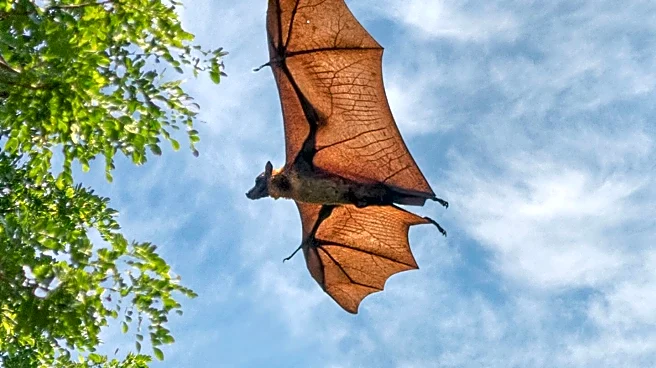What's Happening?
A rabid bat was discovered near Seattle's Washington Park Arboretum, prompting health officials to issue a warning to the public. The bat was found on a residential road at 1726 Boyer Avenue East after two individuals reportedly gave it water. The bat was euthanized by an animal control agency and tested positive for rabies. Public Health – Seattle & King County advises anyone who may have had contact with the bat to seek immediate medical evaluation to determine if preventive rabies treatment is necessary. Rabies is almost always fatal once symptoms begin, but it can be treated if caught early. The identities of the two individuals who interacted with the bat are unknown, and no other exposures have been reported. Health officials emphasize the importance of avoiding contact with bats and seeking veterinary advice if pets may have been exposed.
Why It's Important?
The discovery of a rabid bat near a populated area raises significant public health concerns due to the fatal nature of rabies once symptoms appear. Rabies can be transmitted through contact with infected animals, making it crucial for individuals and pet owners to be vigilant. The incident underscores the importance of public awareness and prompt medical intervention to prevent potential outbreaks. Health officials are urging the community to report any contact with bats and to ensure pets are up-to-date on rabies vaccinations. This situation highlights the need for effective communication between public health authorities and the community to manage and mitigate health risks.
What's Next?
Public Health – Seattle & King County is actively monitoring the situation and advising residents on preventive measures. They recommend contacting animal control if a bat is found outside and seeking medical advice if a bat is found indoors. The agency is prepared to test bats for rabies if necessary and is providing guidance on safely capturing bats for testing. Continued public education efforts are expected to ensure community safety and prevent further incidents. Residents are encouraged to report any unusual bat activity and to follow health guidelines to protect themselves and their pets.
Beyond the Headlines
The incident may lead to increased scrutiny of wildlife interactions in urban areas and the protocols for handling potential rabies cases. It also raises ethical considerations regarding wildlife management and the balance between public safety and animal welfare. Long-term, this event could influence public health policies and community engagement strategies to better address zoonotic diseases.










